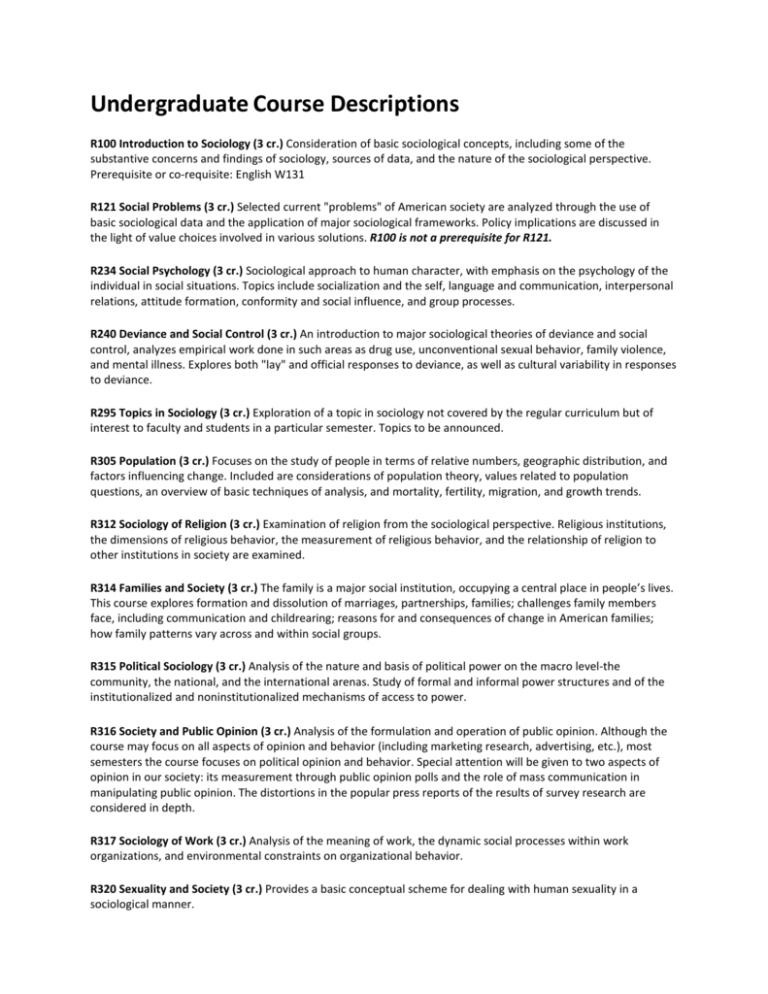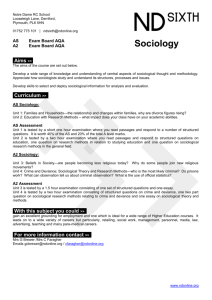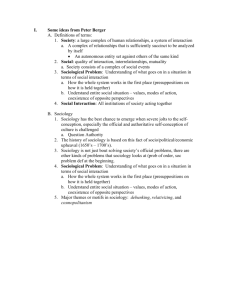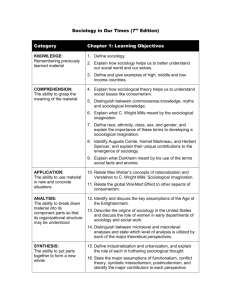Undergraduate Course Descriptions - IUPUI
advertisement

Undergraduate Course Descriptions R100 Introduction to Sociology (3 cr.) Consideration of basic sociological concepts, including some of the substantive concerns and findings of sociology, sources of data, and the nature of the sociological perspective. Prerequisite or co‐requisite: English W131 R121 Social Problems (3 cr.) Selected current "problems" of American society are analyzed through the use of basic sociological data and the application of major sociological frameworks. Policy implications are discussed in the light of value choices involved in various solutions. R100 is not a prerequisite for R121. R234 Social Psychology (3 cr.) Sociological approach to human character, with emphasis on the psychology of the individual in social situations. Topics include socialization and the self, language and communication, interpersonal relations, attitude formation, conformity and social influence, and group processes. R240 Deviance and Social Control (3 cr.) An introduction to major sociological theories of deviance and social control, analyzes empirical work done in such areas as drug use, unconventional sexual behavior, family violence, and mental illness. Explores both "lay" and official responses to deviance, as well as cultural variability in responses to deviance. R295 Topics in Sociology (3 cr.) Exploration of a topic in sociology not covered by the regular curriculum but of interest to faculty and students in a particular semester. Topics to be announced. R305 Population (3 cr.) Focuses on the study of people in terms of relative numbers, geographic distribution, and factors influencing change. Included are considerations of population theory, values related to population questions, an overview of basic techniques of analysis, and mortality, fertility, migration, and growth trends. R312 Sociology of Religion (3 cr.) Examination of religion from the sociological perspective. Religious institutions, the dimensions of religious behavior, the measurement of religious behavior, and the relationship of religion to other institutions in society are examined. R314 Families and Society (3 cr.) The family is a major social institution, occupying a central place in people’s lives. This course explores formation and dissolution of marriages, partnerships, families; challenges family members face, including communication and childrearing; reasons for and consequences of change in American families; how family patterns vary across and within social groups. R315 Political Sociology (3 cr.) Analysis of the nature and basis of political power on the macro level‐the community, the national, and the international arenas. Study of formal and informal power structures and of the institutionalized and noninstitutionalized mechanisms of access to power. R316 Society and Public Opinion (3 cr.) Analysis of the formulation and operation of public opinion. Although the course may focus on all aspects of opinion and behavior (including marketing research, advertising, etc.), most semesters the course focuses on political opinion and behavior. Special attention will be given to two aspects of opinion in our society: its measurement through public opinion polls and the role of mass communication in manipulating public opinion. The distortions in the popular press reports of the results of survey research are considered in depth. R317 Sociology of Work (3 cr.) Analysis of the meaning of work, the dynamic social processes within work organizations, and environmental constraints on organizational behavior. R320 Sexuality and Society (3 cr.) Provides a basic conceptual scheme for dealing with human sexuality in a sociological manner. R321 Women and Health (3 cr.) A review of the relationships among cultural values, social structure, disease, and wellness, with special attention focused on the impact of gender role on symptomatology and access to health care. Selected contemporary health problem areas will be examined in depth. Alternative models of health care delivery will be identified and discussed. R325 Gender and Society (3 cr.) A sociological examination of the roles of women and men in society, analysis of the determinants and consequences of these roles, and assessment of forces likely to bring about future change in these roles. Although focus will be on contemporary American society, cross‐cultural variations in gender roles will also be noted. R327 Sociology of Death and Dying (3 cr.) This course examines inevitable and salient features of the human condition. Historical evaluation of images and attitudes toward death, the medicalization of death, the human consequences of high‐tech dying, the role of the family in caring for dying loved ones, the emergence and role of hospices, the social roles of funerals, grief and bereavement, euthanasia and suicide, the worlds of dying children and grieving parents, and genocide are major issues that are addressed. Two of the major themes of the course revolve around the idea that the way we die is a reflection of the way we live; and, that the study of dying and death is an important way of studying and affirming the value of life. R329 Urban Sociology (3 cr.) The social dynamics of urbanization, urban social structure, and urban ecology. Theories of urban development; the city as a form of social organization; macroprocesses of urbanization both in the U.S. and other countries. R330 Community (3 cr.) Social, psychological, and structural features of community life. Topics include microphenomena such as the neighborhood, networks of friendship and oppositions, social participation, community power structure, and institutional framework. R333 Sports and Society (3 cr.) This course will examine the importance sports and leisure activities play in society. From local examples such as Indiana motorsports and high school basketball, to international examples such as the Olympics and World Cup, we will examine sports from the perspective of athletes and fans, look at sports as an increasingly important business, and discuss how sports have been a significant agent for social change (including Title Nine, and the integration of major league baseball). R335 Sociological Perspectives on the Life Course (3 cr.) Focuses on the human life course as a product of social structure, culture, and history. Attention is given to life course contexts, transitions, and trajectories from youth to old age; work, family, and school influences; self‐concept development, occupational attainment, and role acquisition over the life course. R338 Comparative Social Systems (3 cr.) Selected societies are taken up in detail and compared with the modern United States in terms of basic cultural values, social stratification, social control, and international relations. Lectures and readings cover the Huron Indians, Russia, Sweden, and Japan. Student presentations will deal with underdeveloped or Third World countries. R344 Juvenile Delinquency and Society (3 cr.) Legal definition of delinquency, measurement and distribution of delinquency. Causal theories considered for empirical adequacy and policy implications. Procedures for processing juvenile offenders by police, courts, and prisons are examined. R345 Crime and Society (3 cr.) Examination of the creation, selection, and disposition of persons labeled criminal. Emphasis on crime as an expression of group conflict and interest. Critique of academic and popular theories of crime and punishment. R346 Control of Crime (3 cr.) History, objectives, and operation of the crime control system in relation to its sociopolitical context. Critical examination of philosophies of punishment and programs of rehabilitation. R349 Practicum in Victimology (3 cr.) The role of the victim in the criminal justice system is examined through both course work and practical experience as a volunteer with the Marion County Prosecutor’s Witness‐Victim Assistance Program. Recommended for students with interest in deviance, criminology, law, criminal justice, and social service. R351 Social Science Research Methods (3 cr.) A survey of methods and techniques used by sociologists and other social scientists for gathering and interpreting information about human social behavior. R355 Social Theory (3 cr.) This course covers several traditions of classical, contemporary, and post‐modern social thought (e.g., social Darwinism, conflict theory, functionalism, symbolic interactionism, critical theory, and feminist theory). The social context, construction, and application theories are included. R356 Foundations of Social Theory (3 cr.) Examination of the fundamental issues and perspectives in classical theories. Special focus will be on analysis of the major nineteenth‐century theories that influenced later sociological thought. R357 Contemporary Sociological Theory (3 cr.) Emphasis on theoretical developments of the twentieth century and the relationships of current theories to classical theories. R359 Introduction to Sociological Statistics (3 cr.) Measures of central tendency, dispersion, standardizing and normalizing procedures, and simple index numbers. Simple notions of probability as related to statistical inference (means, proportions, binomial distribution, chi‐square, simple regression). R381 Social Factors in Health and Illness (3 cr.) Focus on the reciprocal relationships between social and physiological factors in health and illness. Specific considerations include ways in which physical status influences social behavior and the manner in which social structure enhances or endangers physical health. R385 AIDS and Society (3 cr.) This course examines the HIV/AIDS epidemic from a sociological perspective. Students will explore how social factors have shaped the course of the epidemic and the experience of HIV disease. The impact of the epidemic on health care, government, and other social institutions will also be discussed. R382 Social Organization of Health Care (3 cr.) Survey of the nature of health care systems. Patient and professional role behavior are explored as well as the characteristics of different health care settings. R410 Alcohol and Society (3 cr.) This course examines the key issues within the vast plethora of issue‐items surrounding the use of drugs and alcohol in U.S. society. The historical evolution of laws and regulations controlling the availability of the more controversial of these substances are emphasized, with an eye toward the politics underlying the patterning of such controls. Unmasking myths, unraveling exaggerations, and exposing dishonest appraisals about the nature and properties of these substances will jointly be pursued. R415 Sociology of Disability (3 cr.) An examination of current models of disability and of disability at the interpersonal and societal level. Topics include recent legal, social, and educational changes; the ways in which people with disabilities interact with the nondisabled; the role played by relatives and caregivers; and the image of people with disabilities in film, television, and other media. Recommended for students in nursing, education, physical and occupational therapy, and social work, as well as for the medical sociology minor. Available for graduate credit. R420 Sociology of Education (3 cr.) A survey of sociological approaches to the study of education, covering such major topics as (a) education as a social institution, (b) the school of society, (c) the school as a social system, and (d) the sociology of learning. R425 Gender and Work (3 cr.) This course examines the changing roles that women and men play in paid and unpaid work, and how these roles are socially constructed, through socialization practices, social interaction, and actions of social institutions. The interaction of gender, race, ethnicity, and social class on individuals’ involvement in work will also be explored. R430 Families and Social Policy (3 cr.) This seminar explores how the state and labor market currently affect family structure and the quality of family life in the U.S. and the role the state and labor market could play in the future. Family policies in other parts of the world will be considered for possible applicability to the U.S. R461 Race and Ethnic Relations (3 cr.) Comparative study of racial, ethnic, and religious relations. Focus on patterns of inclusion and exclusion of minority groups by majority groups. Discussion of theories of inter‐group tensions‐prejudice and discrimination‐and of corresponding approaches to the reduction of tensions. R463 Inequality and Society (3 cr.) Presentation of conservative and radical theories of class formation, consciousness, mobility, and class consequences. Relevance of social class to social structure and personality. Emphasis on the American class system, with some attention given to class systems in other societies. R467 Social Change (3 cr.) Basic concepts, models, and individual theories of social change; historical and contemporary analysis of the structural and psychological ramifications of major social trends. R476 Social Movements (3 cr.) Study of the origins and dynamics of contemporary social movements in American society, with some attention to cross‐national movements. Coverage of progressive and regressive movements aimed at changing the social, economic, and political structure of the society. Case studies of expressive and ideological movements, including fads, cults, and revolts and revolutions. R478 Formal Organizations (3 cr.) Sociological inquiry into the nature, origin, and functions of bureaucratic organizations. Emphasis on bureaucratic organizations as the predominant mode of contemporary task performance and on their social‐psychological consequences. Theoretical and empirical considerations in organizational studies from Weber to contemporary findings. R480 Sociology and Social Policy (3 cr.) This course is a broad review of the increasing use of sociology in the formulation and implementation of social policy. Specific case studies will be examined. Recommended for students with an interest in medicine, law, education, social service, urban affairs, etc. R481 Evaluation Research Methods (3 cr.) A comprehensive study of research techniques and practical applications in the area of the evaluation of social programs. Recommended for students with an interest in social research concerning medicine, law, education, social service, urban affairs, etc. R485 Sociology of Mental Illness (3 cr.) A survey of current problems in psychiatric diagnosis, the social epidemiology of mental illness, institutional and informal caregiving, family burden, homelessness, and the development and impact of current mental health policy. Cross‐cultural and historical materials, derived from the work of anthropologists and historians, are used throughout the course. R490 Survey Research Methods (3 cr.) In this practicum, students will design and conduct a survey, learn how to code survey results, enter data, and analyze data with the mainframe computer. A report will also be written. The advantages and disadvantages of survey methodology will be highlighted and ethical issues will be discussed. R493 Practicum in Sociological Fieldwork (3 cr.) Role of systematic observation as a sociological method. Training in fieldwork techniques and the application of sociological concepts to actual social situations. The core of this course will involve a supervised fieldwork research project in some area of social life. Prerequisite: R351, senior standing or consent of the instructor. R494 Internship Program in Sociology (3‐6 cr.) This course involves students working in organizations where they apply or gain practical insight into sociological concepts, theories, and knowledge. Students analyze their experiences through work logs, a paper, and regular meetings with the internship director. Prerequisite: see details under Internship. R495 Topics in Sociology (3 cr.) Exploration of a topic in sociology not covered by the regular curriculum but of interest to faculty and students in a particular semester. Topics to be announced. R497 Individual Readings in Sociology (1‐3 cr.) Investigation of a topic not covered in the regular curriculum that is of special interest to the student and that the student wishes to pursue in greater detail. Normally available only to majors through arrangement with a faculty member. Prerequisite: Consent of instructor and 9 credit hours of sociology courses with a grade of C or better. R498 Capstone Seminar (3 cr.) This seminar is designed to help graduating seniors synthesize and demonstrate learning in their major. It provides opportunities for students to integrate what they have learned in sociology classes, while engaging in enjoyable interaction with other students who are also completing majors in sociology. Prerequisite: Majors only, completed (with a C or higher) or be enrolled in all required sociology courses.








